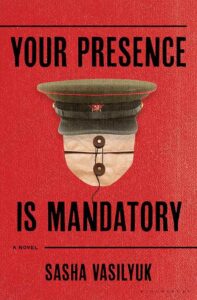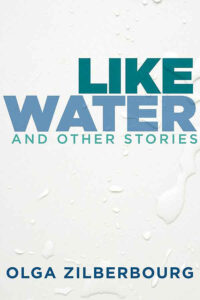Author Panel
Between War and Peace

Author panel featuring Margarita Meklina, Tatyana Sundeyeva, Olga Zilberbourg, and Sasha Vasilyuk
1:00pm | Helzel Study Room
Jewish Arts and Bookfest
Sunday, May 4, 2025
at UC Berkeley’s Magnes Collection of Jewish Art and Life, 2121 Allston Way, Berkeley, CA
About Margarita Meklina
Margarita Meklina is a bilingual author born in Leningrad (the former USSR). She came to the US as a refugee in the early 1990s. The winner of the Andrei Bely Prize (2003), the Yeltsin Center Russian Prize (2008), the Franc-tireur Silver Bullet Prize (2009) for her book written with the dissident poet Arkadii Dragomoshchenko, and the Aldanov Literary Prize for her novella “Ulay in Lithuania” which was inspired by her meeting with the famous performance artist Ulay and his stories about artworld, Meklina saw her books vanish from bookshelves and her publishing contracts in Russia evaporate due to her positioning as a supporter of LGBTQ+ rights. With Anne Fisher, she co-curated “Life Stories, Death Sentences,” a folio of LGBTQ+ literature translated from Russian and, together with The Brooklyn Rail/In Translation, facilitated a multilingual reading in New York city, to coincide with the 50th Anniversary of the Stonewall riots. An author of The Little Gaucho Who Loved Don Quixote, an English-language novel about Jewish settlers in Argentina and a collection of short stories, The Sauce Stealer, that features a text about an Italian-Jewish girl who perished in the Holocaust, Meklina frequently addresses Jewish topics in her writings both in Russian and English. Her new chapbook printed in Berlin uses in its title a Yiddish word and the Jewish “lucky number” 18: “18 Shticks.” Her new novella about her visit to Israel after October 7, “The Ring of Fire,” is going to appear in the Russian-language magazine “Zerkalo” published in Tel Aviv.
Photo credit: Tanya Raush
 The Little Gaucho Who Loved Don Quixote
The Little Gaucho Who Loved Don Quixote
Loosely based on the biography of the Russian-born writer Alberto Gerchunoff, who became famous for his portrayal of Jewish gauchos living on the Argentinean pampas, the story of Naftali follows the adventures of a twelve-years old boy who escapes the Russia of the 19th century and moves with his family, under the sponsorship of the philanthropist Baron Maurice Hirsch, to a Jewish colony in Argentina, in the hope of finding a worry-free life free of the Russian Tsar and anti-Semitism. Along the way Naftali befriends a local eccentric with a dog so old that it has to be pulled on a platform with wheels; a boy who collects maps and uses them to travel in his imagination in defiance of the Pale of Settlement; a book peddler who introduces him to Cervantes’s Don Quixote; and young gauchos who teach him how to ride a rhea. Naftali’s story becomes a full-blown account of the childhood of a future writer who, possessed by dreams of Don Quixote and haunted by the murder of his father, overcomes the difficulties of immigration and grows infatuated not only with Don Quixote but with everything related to books. The Little Gaucho Who Loved Don Quixote covers not only the panorama of life in the Russian empire and then in Argentinean pampas as seen through a boy’s eyes, but also episodes of Cervantes’s novel that the sensitive and inquisitive young mind compares to his seemingly boring and uneventful life in Russia, imagining for example that Baron Hirsch is Don Quixote in disguise. The novel ends with an image of a mature Naftali who recounts his ordeal during a flood, when he is saved by another “Don Quixote,” a kind and mysterious gaucho, and decides to write a book about Cervantes and his creation. Since Naftali is well-read, goes to a Jewish school, and meets another original character, Favel Bavilsky, a poet who loves to weave romanticized stories, the novel is peppered with historical vignettes from the Jewish life and the far away past.
About Tatyana Sundeyeva
Originally from Kishinev, Moldova, Tatyana Sundeyeva is a Jewish writer living in Northern California. She has been published in Hadassah Magazine, Fractured Literary, Cleaver, and others. She is currently working on a short story collection. You can find her on TatyanaWrites.com.
Photo credit: Luis Orozco
About Sasha Vasilyuk
Sasha Vasilyuk is a journalist and author of a debut novel, Your Presence Is Mandatory (Bloomsbury), longlisted for the Center for Fiction First Novel Prize and translated into seven languages. Her nonfiction has been published in the New York Times, CNN, Harper’s Bazaar, Time, USA Today, Los Angeles Times, Telegraph, KQED, and elsewhere. Sasha grew up between Ukraine and Russia before immigrating to the U.S. at the age of 13.
Photo credit: Irene Young
 Your Presence Is Mandatory
Your Presence Is Mandatory
Spanning between World War II and the Russia-Ukraine conflict and based on real events, Your Presence Is Mandatory is a riveting debut novel about a Ukrainian Jewish WWII veteran with a lifelong secret, the repercussions for his family, and the grace they find in the course of their survival.
About Olga Zilberbourg
Olga Zilberbourg’s English-language debut Like Water and Other Stories (WTAW Press) explores “bicultural identity hilariously, poignantly,” according to The Moscow Times. It also deals with bisexuality and immigrant parenthood. Zilberbourg’s writing has appeared in Narrative Magazine, World Literature Today, Confrontation, Electric Literature, Lit Hub, Alaska Quarterly Review, and elsewhere. Born in Leningrad, USSR, in a Russian-speaking Jewish family, she has published four books of fiction in Russian. Currently, she makes her home in San Francisco, California where she co-facilitates the San Francisco Writers Workshop. Together with Yelena Furman, she has co-founded Punctured Lines, a feminist blog about literatures from the former Soviet Union. She is currently at work on her first novel.
Photo credit: Gulsum Nabi
 Like Water and Other Stories
Like Water and Other Stories
With settings that range from the Cuban Missile Crisis and Soviet-era Perestroika to present-day San Francisco, Like Water and Other Stories, the first English-language collection from Leningrad-born author Olga Zilberbourg, looks at family and childrearing in ways both unsettling and tender, and characters who grapple with complicated legacies—of state, parentage, displacement, and identity. Like Water is a unique portrayal of motherhood, of immigration and adaptation, and an inside account of life in the Soviet Union and its dissolution. Zilberbourg’s stories investigate how motherhood reshapes the sense of self—and in ways that are often bewildering—against an uncharted landscape of American culture.
